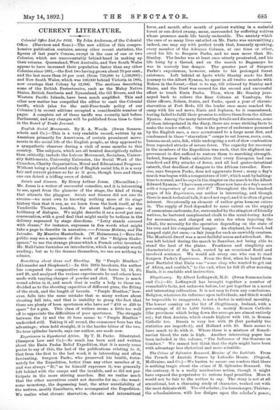Experiences in Equatorial Africa. By T. H. Parke. Illustrated. (Sampson
Low and Co.)—So much has been said and written about the Emin Pasha Relief Expedition, that it is surely some praise to say of this, the last of the publications relating to it, that from the first to the last word, it is interesting and often fascinating. Surgeon Parke, who preserved his health, fortu- nately for the Expedition, better than any other member of it, and was always "fit," as he himself expresses it, was generally left behind with the camps and the invalids, and so did not par- ticipate in the more stirring marches. But we realise much that the other narratives could not describe for us,—the weari- some monotony, the depressing heat, the utter unreliability of the natives, mostly Zanzibaris, who accompanied the Expedition. We realise what chronic starvation, chronic and intermittent
fever, and month after month of patient waiting in a malarial forest or sun-dried swamp, mean, surrounded by suffering natives whose presence made life barely endurable. The anxiety which
the care of so many lives entailed on Mr. Parke was unremitting; indeed, one may say with perfect truth that, humanly speaking, every member of the Advance Column, at one time or other, owed his life to Surgeon Parke, and no man more than Mr. Stanley. The leader was at least once utterly prostrated, and his life hung by a thread, and on the march to Bagamoyo he was in scarcely less danger. The greater part of Surgeon Parke's experiences, however, relate to his prolonged forest existence. Left behind at Ipoto while Stanley made his first journey to the Albert Nyanza, he spent in all twelve months with Nelson in the forest—that is to say, till relieved by Stanley and Stairs, and the Ituri was crossed for the second and successful effort to touch Emin Pasha. Then, when Mr. Stanley jour- neyed back to relieve the Rear Column at Yambuya, the three officers, Nelson, Stairs, and Parke, spent a year of chronic starvation at Fort Bodo, till the leader once more reached the camp with his sad news, Emin and Jephson, be it remembered, having failed to fulfil their promise to relieve them from the Albert Nyanza. Among the many interesting details and discussions, some of them interpolated in the diary, there are some striking facts to make the reader reflect. One is the power of endurance possessed by the English race, a. race accustomed to a large meat diet, and condemned in these " starvation " camps to eat leaves, roots, corn, banana-meal, ants, fish, while undergoing a sort of slow combustion from repeated attacks of severe fever. The capacity for recovery in the members of the Expedition was such, that the slightest im- provement in diet sufficed to restore them to marching strength. Indeed, Surgeon Parke calculates that every European had one hundred and fifty attacks of fever, and all had gastro-intestinal catarrh, that deadliest of dangers to the African traveller. Exer- cise, says Surgeon Parke, does not aggravate fever ; many a day's march was begun with a temperature of 103°, which sank by halting- time to normal, and he says in the chapter on the march to the Albert Edward Nyanza: "I have seen every officer now here do a day's march with a temperature of over 105° P." Throughout the five hundred pages of his Experiences, our author is interesting, and though there is much technical tallc,it need not repel, and it is of ten of great interest. Occasionally an element of rather grim humour enters in. The supply of food depended to some extent on the supply of ammonium carbonate, for, surrounded by the stingiest of friendly natives, he bartered camphorated chalk to the scent-loving Arabs for necessaries, and charged an extra fee when injecting the alkali, the necessity for the operation depending on the state of his own and his companions' hunger. An elephant, he found, had jumped eight feet once,—a fair jump for such an unwieldy creature. The llionbutti dwerf was a most faithful nurse and attendant. She was left behind during the march to Zanzibar, not being able to stand the heat of the plains. Frankness and simplicity are characteristics of the book, varied by an occasional florid and involved sentence. We would ask every one who can to read Surgeon Parke's Experiences. From the first, when he heard from poor Barttelot that Emin was "some chap who wanted to get out of Africa, and couldn't," to the end, when he fell ill after nursing Emin, it is readable and instructive.






































 Previous page
Previous page